“My Name is Lucy Barton” features excellent Laura Linney in a potboiler

Laura Linney creates a fine portrait of a women seeking to pull a life out of a harrowing childhood in a play that unfortunately descends into soap opera.

Laura Linney creates a fine portrait of a women seeking to pull a life out of a harrowing childhood in a play that unfortunately descends into soap opera.
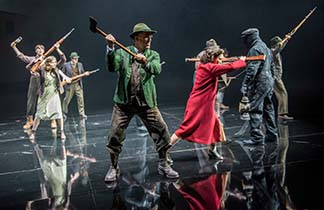
This riveting 1937 play is a combination of Brechtian social criticism and Ionesco political allegory, both à propos for a surreal story about Nazi era Europe. When he wrote the play, Hitler was in power and the Nuremberg laws in effect. There‘s a sense of Germanic gothic.

Even if you don‘t like rock, you will appreciate Adrienne Warren‘s bravura performance in this feminist story about a woman who puts up with abuse for years and finally throws off her Svengali to become a world-famous singer.
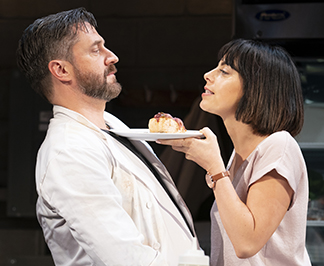
On the menu of this clever, succulent play are the characters who make up the back of a boutique restaurant in Park Slope, a trendy neighborhood in Brooklyn where playwright Theresa Rebeck lives. Director Moritz Von Stuelpnagel makes them all eminently real, albeit somewhat New York neurotic in their own ways.

They couldn‘t have picked a better title to describe the leading Democrats and Republicans, one side defending a leader who sets a record for lying and the other doing so more subtly with fakery supported by a Deep State outraged that it can‘t make policy.
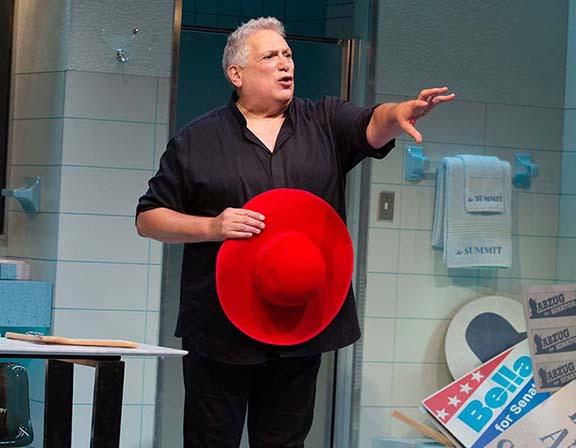
I knew Bella Abzug, so my reaction to this play is deeper and more personal than it might otherwise be. I started out wondering how a guy could create the story of a feminist woman. Would this slip into drag?

This is an amazing play. With Robert Schenkkan‘s 2014 “All the Way,” first part of his Lyndon Johnson story, it is among the most important historic American plays.
It could be a Shakespeare play, a tragedy that engulfs a complex, larger-than-life figure. And one who is brought down by his own hubris. The story moves between the civil rights movement and the American war against Vietnam. And because I knew some of the characters, I have strong feelings about it.
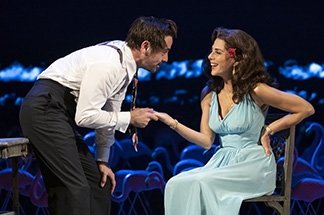
Serafina Delle Rose (Marisa Tomei) is traditional and feminist at the same time. And sensual. Traditional means Sicilian earthy, because she and her husband are Sicilians living on the Gulf Coast of Louisiana, between New Orleans and Mobile, in an area populated by their countrymen. It is 1950, and they have the sensibility of Sicilian peasants.
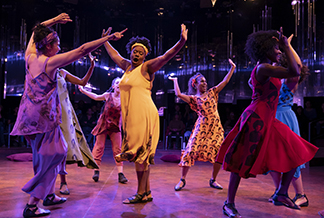
Ntozake Shange‘s 1975 play is a dramatized and choreographed consciousness-raising session. This is about blacks, so it includes a lot of race specific cultural facts. It could have been about women of any race or ethnic group. If you were a feminist in the 70s, you were likely in a consciousness-raising group. I was. This was a powerful, visionary play for its time, and it gets a worthy revival at the Public Theater.
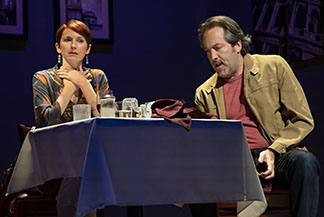
In Tracy Letts‘ story of mid-life crisis, Wheeler (Ian Barford) is a guy of 50 who was ditched by his wife and still can‘t figure it out. He has a lot of the traits that should make trendy folks of his age like him. He likes Miles, Coltrane, Ella. Hates rock. Likes Fellini and Bergman. Hates movies made for men with 13-year-old minds. Likes to think of himself as sensitive, viz a photo he took of a child in a hospital years ago. He‘s acceptable-looking, with only a hint of a paunch.
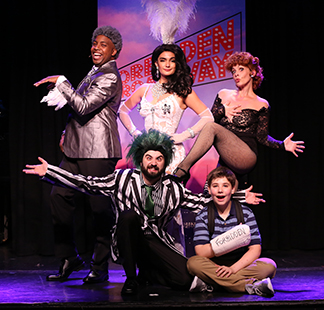
The forbidden is sweet. Especially when it comes to Gerard Alessandrini‘s Forbidden Broadway musical parodies. This is their 37th year, and as some years are skipped, aficionados look forward to them like a vintage Premier Cru. Good music. Check. Clever book. Check. Terrific performers. Check.
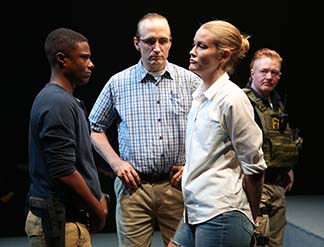
I don‘t know what the title means. And I don‘t know what the play is supposed to mean. Other than that Reality Winner is a loser. And so is the “conceiver” and director Tina Satter, who decided that a Q&A with a couple of FBI agents was enough to be a play. About someone with security clearance who downloaded a classified report and sent it to some media. Without telling us what it was about. Or who she sent it to. Or why.
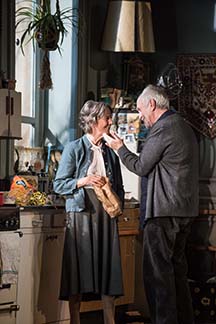
What happens to the partner of a 50-year marriage living without the other? What if the husband dies and the wife survives? What if the wife dies? What would each do? How would each cope? How would their children, in this case grown daughters, react?
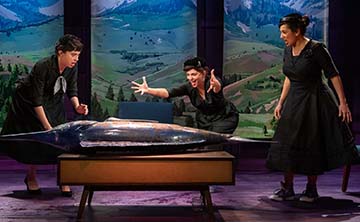
The first half of Jaclyn Backhaus‘ feminist satire “Wives” is hilariously funny. The mordant wit doesn‘t last till the end, but the first parts are so good, it‘s very much worth seeing. The idea is to focus on the wives of some famous men. You haven‘t seen anything like it.

Dozens of patrons, as many as 75, artistic director Ross Williams said, perched on stools and benches and gathered in the pit as actors performed excerpts from four of Shakespeare‘s plays: “The Comedy of Errors,” “Romeo and Juliet,” “As You Like It” and “Henry IV, part 2.”

In 1978, Harold Pinter wrote a play inspired by his seven-year affair in the 1960s with Joan Bakewell, a BBC presenter. He was married at the time to actress Vivien Merchant and left her in 1975 after 20 years and one son. He married author Antonia Fraser in 1980.

Why does an accomplished French theater and film actress want to act in an American web series? Nathalie Schmidt stars in “I Do,” a story set in Brooklyn about Zoe and her screwball attempts to catch a husband. Each episode will be about another prospective guy.
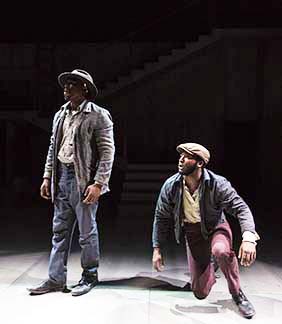
Galen Ryan Kane gives a shattering performance as Bigger Thomas, the anti-hero victim of Nambi Kelley‘s bravura take on Richard Wright‘s 1940 novel of the desperation of inner-city black men.
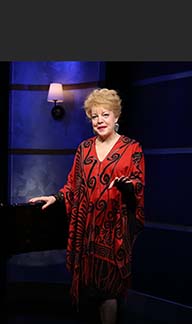
KT Sullivan is a smash as a comic Elaine Stritch in Noël Coward‘s “Why do the wrong people travel?”
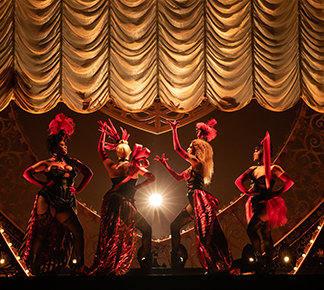
It certainly was red, all over, except perhaps for the life-size naturally gray elephant on a riser to the right. Red must mean demimonde. The women are in bustiers and mostly bare bottoms. It‘s garish Montmartre. Or, forget Paris, it‘s old Las Vegas.

Jonathan Cake is terrific as Caius Martius, the Roman general who is a master of war and an abject failure at politics. The one demands a tough hierarchical leader in a system where everyone below must follow commands.
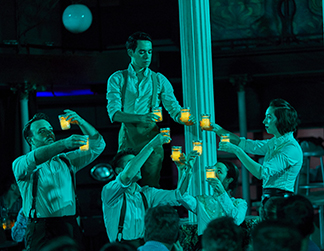
A café performance of “Midsummer Night‘s Dream” is quite a delightful way to spend any mid-summer eve. And the actors of this production, who double passing out tapas and wine to patrons, are as good as any you‘ll see on the boards. In fact, most of them have been there.
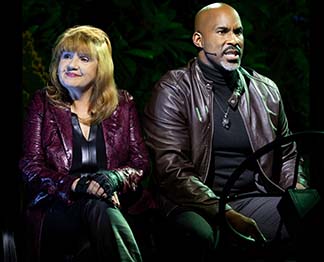
A bit of summer fluff, slightly hokey, but with a good underlying message, this play by Joe Iconis, Lance Rubin, and Jason Sweettooth Williams, is about an “older woman,” Annie (Annie Golden) who can no longer get roles in theater and is scooped up by a bounty hunting firm on the track of a drug trafficker hiding out in the jungles of Ecuador.
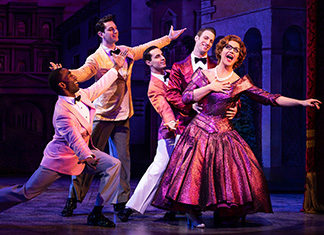
Stories about men pretending to be women walk a fine line between skewering sexism and practicing it. “Tootsie” falls on both sides of that divide.
And this one, book by Robert Horn based on the 1982 film, is somewhat outdated. Real gender-bending stuff makes it unbelievably tame. And those stereotypes just don’t go away. But it gets a good breezy production by director Scott Ellis, including a Fosse-style chorus line. And there is a cacophony of funny new topical one-liners.
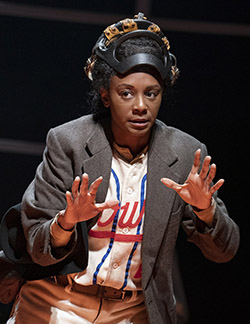
In the 1920s, an original, a young black woman with a fanatical devotion to the quintessential American sport, fought racism and sexism to become the first woman to play in professional baseball as a regular on a big-league team. She played in the Negro Leagues.